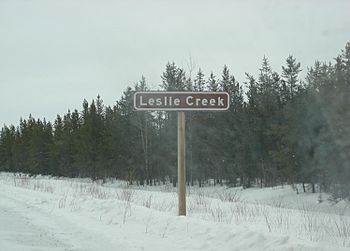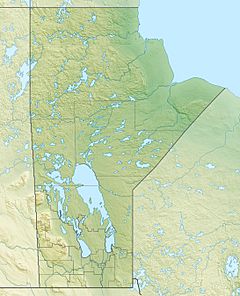Leslie Creek (Manitoba) facts for kids
Quick facts for kids Leslie Creek |
|
|---|---|

Road sign for Leslie Creek
|
|
|
Location of the mouth of Leslie Creek in Manitoba
|
|
| Country | Canada |
| Province | Manitoba |
| Region | Northern |
| Physical characteristics | |
| Main source | Marsh 136 m (446 ft) 56°29′26″N 94°27′09″W / 56.49056°N 94.45250°W |
| River mouth | Nelson River 88 m (289 ft) 56°25′03″N 94°13′45″W / 56.41750°N 94.22917°W |
| Basin features | |
| River system | Hudson Bay drainage basin |
Leslie Creek is a small river located in the Northern part of Manitoba, Canada. It is part of the huge Hudson Bay drainage basin. This means all the water from Leslie Creek eventually flows into Hudson Bay.
Leslie Creek is a tributary of the Nelson River. A tributary is a smaller stream or river that flows into a larger one. Leslie Creek joins the Nelson River from its left side.
Contents
Exploring Leslie Creek's Journey
Leslie Creek begins its journey in a marsh, which is a type of wetland with grassy plants. The source of the creek is about 136 meters (446 feet) above sea level. From there, it flows downhill, eventually reaching the Nelson River.
Where Leslie Creek is Located
Leslie Creek is found in a northern part of Manitoba. This area is known for its vast wilderness and many rivers and lakes. The creek's mouth, where it meets the Nelson River, is about 88 meters (289 feet) above sea level.
The Mighty Nelson River
The Nelson River is one of the largest rivers in North America. It flows from Lake Winnipeg all the way to Hudson Bay. Many smaller rivers, like Leslie Creek, contribute their water to the Nelson River. This makes the Nelson River a very important waterway for the region.
Understanding a Drainage Basin
A drainage basin (also called a watershed) is like a giant funnel. It's an area of land where all the water, from rain or melting snow, drains into a common outlet. For Leslie Creek, that outlet is eventually Hudson Bay. The Hudson Bay drainage basin is one of the largest in the world. It collects water from a huge part of Canada and even some of the United States.
- Water in a drainage basin flows from higher ground to lower ground.
- Smaller streams join to form larger rivers.
- All the water in a basin eventually reaches a main river or a large body of water like a lake or ocean.
 | Emma Amos |
 | Edward Mitchell Bannister |
 | Larry D. Alexander |
 | Ernie Barnes |


